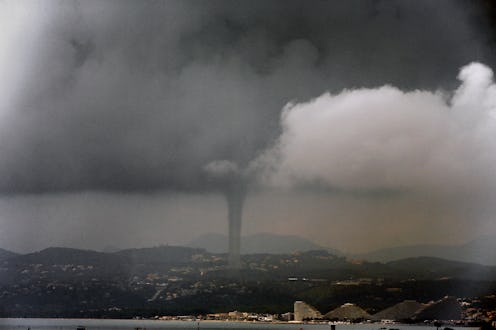News
Is It A Tornado? A Cyclone? A Hurricane?
This weekend has been devastating for towns in the Midwest and the South; powerful tornadoes ripped through Nashville, Arkansas and Van, Texas. In the wake, five people have been confirmed dead and both towns have been hit with immeasurable damage. The deadly twisters in Arkansas and Texas were just a few of the 26 tornadoes spotted down the middle of the country on Sunday, as severe-weather season continues to wreak havoc in the States.
Two of the victims were residents of a mobile home community in Nashville while a third person died in a flood in Corsicana, Texas, which was hit with heavy rains also stemming from the bout of severe weather. Another 26 people were injured in Van, where two other deaths were reported Sunday night.
On Monday, a path of severe weather will continue to shake the country, from Texas to Michigan. The Weather Channel's Kevin Roth told NBC News:
Anywhere from eastern Texas up to southern Michigan there is a threat of tornadoes in the mid-to-late afternoon.
After the destruction the country has seen this past weekend and in the past few weeks, residents are undoubtedly eager for tornado season to be over. However, right around when it ends (June), our hurricane season begins. According to the National Oceanic & Atmospheric Administration, the official Atlantic hurricane season is from June 1 to Nov. 30. In other words, severe weather doesn't stop when tornado season ends.
For the next several weeks, you might hear meteorologists throw out the terms like "tornado," "twister," and "cyclone" seemingly interchangeably, and then after that you'll probably start hearing more about "hurricanes" and "typhoons." In order to better prepare yourself for these natural phenomenons, here is the difference between the most common severe-weather terms.
Tornadoes Vs. Twisters
Tornadoes and twisters are two different terms for the same natural phenomenon, a strong column of air that rotates and travels over land at destructive speeds. Sizes can range from a few yards to several hundred meters in diameter. Tornadoes are usually a downward spiral stemming from a cumulonimbus cloud and are often accompanied by rain, hail, or sleet.
Hurricanes Vs. Typhoons Vs. Cyclones
According to the National Oceanic & Atmospheric Administration, hurricanes, typhoons, and cyclones all describe the same phenomenon. Meteorologists use each one to describe a different region of the world. "Hurricane" is used in the Atlantic and Northeast Pacific, which is why we in the States hear this term the most. In the Northwest Pacific, "typhoon" is used, and over in the South Pacific and Indian Ocean, "cyclone" is used to describe the same weather event.
Hurricanes/typhoons/cyclones are storm systems formed when warm tropical waters release heat as moist air rises, causing condensation of the water vapor in the air. These storm systems are characterized by a low pressure center and if the conditions last, they can result in severe thunderstorms, violent winds, heavy flooding, and devastating waves.
Tornadoes Vs. Cyclones (And Hurricanes And Typhoons)
The National Oceanic & Atmospheric Administration distinguishes tornadoes as something almost entirely different from cyclones. They define tornadoes as an atmospheric vortice with diameters that are hundreds of meters wide produced by a single convective storm (e.g., a thunderstorm). In contrast, a cyclone is an atmospheric vortice with diameters up to hundreds of kilometers and are formed from multiple convective storms. While tornadoes occur almost exclusively over land, cyclones are an oceanic phenomenon that fizzle out once they reach land because they lose their source of moisture. Furthermore, while the lifespan of a cyclone can be days, tornadoes only last minutes.
Images: Getty Images (3)
